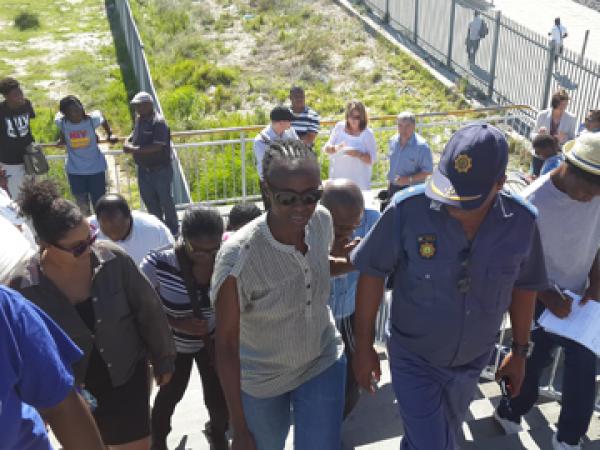The week in political activism

This week, we cover the Khayelitsha Commission of Inquiry, what’s happening in education and the patent wars.
Khayelitsha Commission of Inquiry
All eyes are on the Khayelitsha Commission of Inquiry into policing. The commission at long last commenced its work on 21 January 2014 (it was established in August 2012), starting with an inspection tour of police stations. The Social Justice Coalition, Treatment Action Campaign and Ndifuna Ukwazi were in attendance.
The venue is Lookout Hill, Spine Road, Ilitha Park, Khayelitsha and the first phase of public sittings will be held until Friday 22 February 2014 from Mondays to Fridays from 10am to 4pm with a one-hour lunch adjournment. Go to www.khayelitshacommission.org.za for more information.
School year underway
As children return to school, the issue of school fees will once again move to the fore. Corruption Watch advise that a school declared a no-fee school by the Minister of Basic Education may not charge school fees. Parents who cannot afford to pay should apply to the school governing body for an exemption.
Even in fee-paying schools, a learner may not be deprived of their right to participate in the school despite the non-payment of school fees and may not be victimised for this in any manner. Parents should try to come to a mutual understanding with the school, failing which, and if the pupil is barred from school, it should be brought to the attention of the education department, the South African Human Rights Commission or the Public Protector.
Parents and learners are also waiting to see if textbook delivery will be a problem this year. SECTION27 has been monitoring the state of textbook delivery to schools across Limpopo (where the problem was particularly bad in the country last year). So far, it believes there has been improved delivery. “We commend the Department of Basic Education and the Limpopo Department of Education on their improvement in textbook delivery for the 2014 academic year”, the organisation says. “We encourage schools to continue to report textbooks shortages to the Department of Basic Education, the Limpopo Department of Education and SECTION27 to ensure that these shortages are addressed as soon as possible.”
In November last year, the Minister of Education published minimum norms and standards for school infrastructure. This came after a sustained campaign by Equal Education. It will be interesting to see if this new policy can be used to bring about tangible improvements for schools.
Patent wars
The year could see a scrum over sorting out South Africa’s intellectual property law, a key legislative hurdle to getting life-saving medicines to patients. The Treatment Action Campaign will be watching matters like a hawk.
The organisation has already expressed deep concern about a leaked industry email published by Knowledge Ecology International (KEI) on Monday 20 January 2014 that it says proves the Pharmaceuticals Association of South Africa (IPASA) and US-based industry body PhRMA (the Pharmaceutical Researchers and Manufacturers of America) actively selected the “high calibre consultancy group” – PAE – to subvert the South African intellectual property law reform process and that IPASA’s intellectual property committee was ready to proceed with the proposed plot with “urgency”.
The email provides damning evidence that IPASA lied about not engaging PAE to lobby on intellectual property, and that the engagement was carried out in consultation with PhRMA. The email also reveals IPASA intended to contribute R2.5 million to the PAE plan.
On Friday, IPASA released a statement that said, that it could conirm that it had “not engaged the consultancy PAE to lobby on intellectual property or any other matter in South Africa. PAE submitted a proposal for a campaign, which was reviewed and subsequently rejected by IPASA members, and no payment or pledge has been made in any respect.”
A TAC statement said, “We call on IPASA to state whether they will replace [Michael] Azrak [of MSD] as the Head of their Intellectual Property Committee [of IPASA].” Azrak was the author of the leaked email.
The TAC says although it does not dispute the right of any party to lobby government for or against the IP policy, the “PharmaGate” activities “go far beyond what could be considered acceptable lobbying … The proposed plot would have created a front organization called Forward South Africa, headed by a prominent black South African, and would have had the feel of a political movement – but in reality it would have been run from the United States. The obvious intention would have been to mislead the public into believing that Forward South Africa was an authentic local organization … The plot would also have commissioned ‘independent’ research that would after the fact have been sent to the United States to be massaged to ‘suit the message’. In other words, seemingly rigged research would have been used to delay the finalization of the IP policy.”
Support independent journalism
Donate using Payfast

Don't miss out on the latest news
We respect your privacy, and promise we won't spam you.

This article is licensed under a Creative Commons Attribution-NoDerivatives 4.0 International License.
